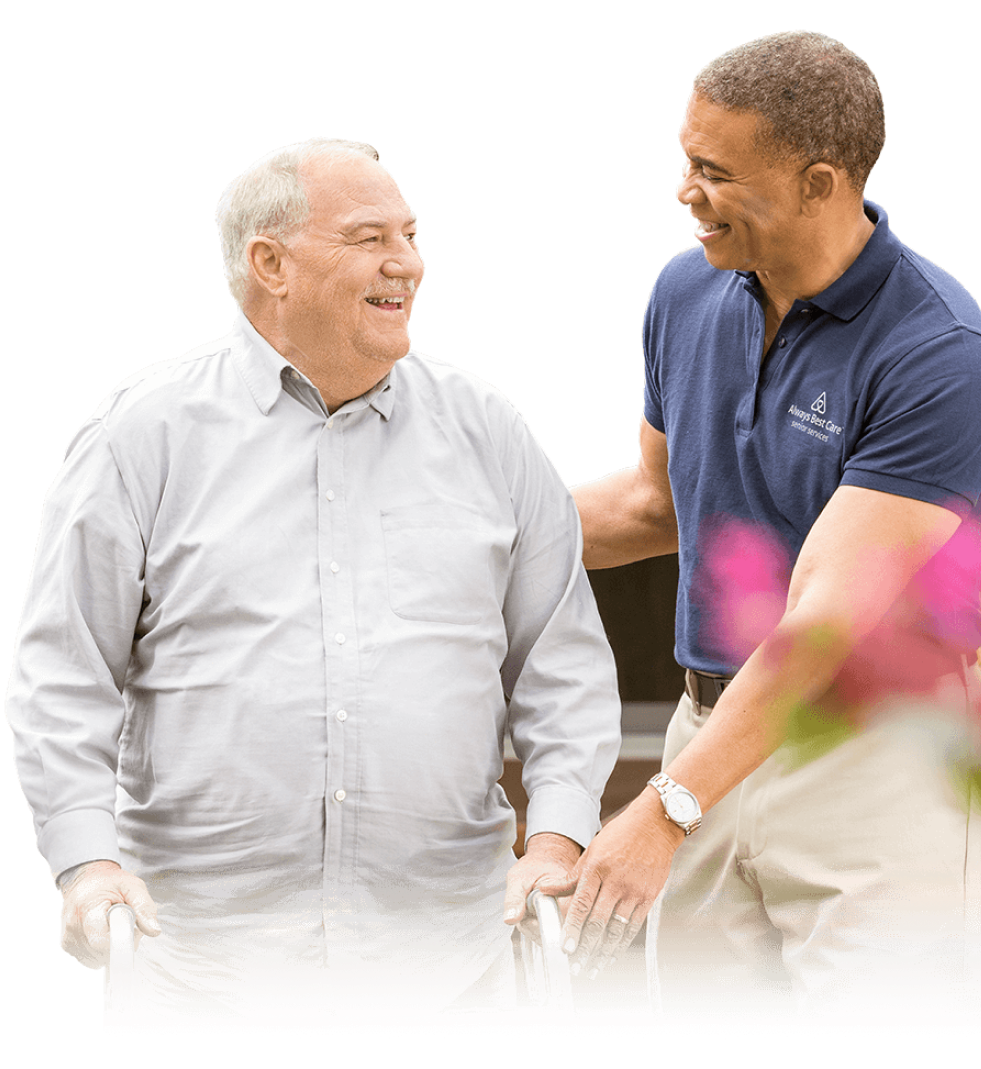This website uses cookies so that we can provide you with the best user experience possible. Cookie information is stored in your browser and performs functions such as recognising you when you return to our website and helping our team to understand which sections of the website you find most interesting and useful.
Home Care In Neshanic Station, NJ

They say that your golden years are the best years of your life. For most older Americans, that's how it should be - a time to relax, reflect, and live life in a familiar place. After all, senior citizens in the U.S. have worked tirelessly to build a better economy, serve their communities, and raise families.
However, as seniors grow older, completing daily tasks like showering and enjoying activities such as visiting the historic Neshanic Station Bridge gets harder without someone by their side. Unfortunately, many older Americans aren't able to rely on their adult children for help. The reality in today's world is that family members do not have the skills or time to dedicate to caring for their parents. That's where Always Best Care Senior Services comes in.
Our in-home care services are for people who prefer to stay at home as they grow older but need ongoing care that family or friends cannot provide. More and more older adults prefer to live far away from long-term, institutionalized facilities and closer to the place where they feel most comfortable - their home. Home care in Neshanic Station, NJ is a safe, effective way to give your loved ones the care they need when they need it the most.

 Home Care Services
Home Care Services
- Home Care in Neshanic Station, NJ
- The Always Best Care Difference
- Types of In-home Care in Neshanic Station, NJ
- Benefits of Home Care in Neshanic Station, NJ
- Aging in Place: The Preferred Choice for Most Seniors
- Affordable Care Plans
- Compassionate Care. Trusted Caregivers
- Assisted Living Referral Services
- Taking the First Step with Always Best Care
 Service Areas
Service Areas
The Always Best Care Difference
Since 1996, Always Best Care has provided non-medical in-home care for seniors to help them maintain a healthy lifestyle as they get older. We are proud to have helped more than 25,000 seniors maintain higher levels of dignity and respect. We focus on providing seniors with the highest level of in-home care available so that they may live happily and independently.
Unlike some senior care companies, we genuinely want to be included in our clients' lives. We believe that personalized care is always the better option over a "one size fits all" approach. To make sure our senior clients receive the best care possible, we pair them with compassionate caregivers who understand their unique needs. That way, they may provide care accordingly without compromising their wellbeing.
The Always Best Care difference lies in life's little moments - where compassionate care and trustworthy experience come together to help seniors live a fruitful, healthy life. Whether you are an aging adult that can't quite keep up with life's daily tasks or the child of a senior who needs regular in-home services, Always Best Care is here to help.
“I am a current client of this provider Always Best Care provided us with two incredibly”
“The care I receive from Always Best Care is outstanding and invaluable in keeping me”
“I am a current client of this provider I am extremely satisfied with my caregiver, thanks”
“I am a past client of this provider When my mother found the day to day”
“I am a past client of this provider Best in Care helped our family during a”
“I am a current client of this provider What a relief to find Always Best Care.”
“What a relief to find Always Best Care. My 84 year old mom raves about”
“I am a past client of this provider My mother needed help after a fall in”
“Greg, Robin, and Clara have been such a gift to our family We are so”
“Greg and all of his staff always go above and beyond to provide my mother”
“I am a past client of this provider We have been caring for my mom since”
“I am a current client of this provider We are currently receiving services from Always Best”
“I am a current client of this provider Always Best Care of Basking Ridge has been”
“My family needed help with my Mom for a family wedding. She lives in assisted”
“My son was getting married and we needed someone to help with my mom during”
“I am a current client of this provider Always Best Care of Basking Ridge (ABCBR) has”
“Gregg was a pleasure to work with. His caring manner, as well as, understanding the”
“I am a current client of this provider Always Best Care of Basking Ridge proved to”
“When I injured my ankle, ABC at Bernardsville, NJ provided one month services to help”
“I am a past client of this provider My husband had a series of illnesses and”
“I am a current client of this provider Always Best Care owners Greg and Robin have”
“Greg and Robin LaVersa truly work hard to make sure they provide exceptional service! Their”
“Greg and his wife, Robin, have been providing care for my mother. All of the”
“I am a current client of this provider Greg, Robin and the staff at Always Best”
“Robin and Greg are hands down the best employers anyone can ever wish for, they”
“I am a past client of this provider Our experience with Greg & Robin was top”
“The service and care that Greg and Robin provide is outstanding! They really listened to”
“I am a current client of this provider All positive experience with Robin and Greg .”
“Our aunt needed care but all of us are out of state. We called Greg”
“Always Best Care provided aides who would come to my mother-in-law's apartment in an independent”
“I am a past client of this provider Always Best Care provided aides who would come”
“A year ago it became clear that my 90 year-old father and 87 year-old mother”
“Greg and Robin have been a true gift to me in taking care of my”
“Greg and Robin have been a true gift to me in taking care of my”
“I am a current client of this provider Greg and Robin have been a true gift”
“I am a past client of this provider I needed a home health aide to care”
“Our brother a physician is a fully disabled Veteran . We considered ourselves lucky to”
“We couldn’t be happier with how Greg and Robin have helped us with our brother’s”
“I have been using Always Best Care for over a year to assist me with”
“Thanks for everything! I never feel like I can't call and discuss events or changes”
“I am a past client of this provider Although we where only in need of Always”
“The attention to detail by owners Robin and Greg cannot be matched. I made one”
“I am a current client of this provider The attention to detail by owners Robin and”
“Greg has been so amazing helping my family, let alone his amazing staff. They don't”
“Greg has been so amazing helping my family. Let alone his amazing staff. They don't”
“My mother has been a client since Feb 2017. Mother's aide, Alexandra, has become mom's”
“I would like to recommend the services of Always Best Care from personal experience through”
“Very caring, reliable and Greg is there to address your every concern.”
“I have known Robin LaVersa my whole life and Greg LaVersa for over 20 years.”
“Nikki does so much more than what is checked off. She talks to dad and”
“Robin and Greg are incredibly warm and engaging individuals. They clearly are in this business”
“Robin and Greg LaVersa of Always Best Care go above and beyond our expectations for”
“I have been very impressed by the attention this Always Best Care office pays to”
“We interviewed 3 different agencies before hiring Always Best Care in Basking Ridge. Greg made”
“My mother has been a client since Feb 2017. Mother's aide, Alexandra, has become mom's”
“I am a current client of this provider My mother has been a client since Feb”
“Always Best Care took away most of the stress I was having with the care”
“Always Best Care took away most of the stress I was having with the care”
“Robin and Greg have been and continue to be a great help to me whenever”
“I am a current client of this provider Robin and Greg have been and continue to”
“Other The owners Robin and Greg are exceptional. I highly recommend sending your loved one to”
“To Whom it may concern I would like to recommend the services of Always Best Care”
“Nikki does so much more than what is checked off. She talks to dad and”
“Robin and Greg LaVersa of Always Best Care go above and beyond our expectations for”
“Very Caring , reliable and Greg is there to address your every concern.”
“Robin and Greg are incredibly warm and engaging individuals. They clearly are in this business”
“I have known Robin LaVersa my whole life and Greg LaVersa for over 20 years.”
“I have been very impressed by the attention this Always Best Care office pays to”
“Greg and Robin have been a true gift to me in taking care of my”
“I am a current client of this provider Always Best Care provided us with two incredibly caring companions which has made all the difference for our family member. We are grateful to have found Always Best Care of Basking Ridge.”
“The care I receive from Always Best Care is outstanding and invaluable in keeping me living independently. Robin and Greg are always responsive to my needs, whether it be basic household chores or assistance getting to places outside my home. They are always friendly, caring and concerned my needs are being met. I can’t say enough about how grateful I am having their assistance.”
“I am a current client of this provider I am extremely satisfied with my caregiver, thanks to Greg and Robin. They made sure it was going to be a good fit for the both of us. It is such a relief to have her do light housekeeping and take care of the chores around my house which I have found too exhausting to do myself. It's been a positive experience in every way having her in my home and working with Greg.”
“I am a past client of this provider When my mother found the day to day chores of independent living challenging, we brought in a home health aid from Always Best Care 4 days a week. Little did we know we were growing our family. The service Greg and Robin provided us exceeded our expectations. They often went above and beyond to ensure my mom stayed happy and healthy living in her home and kept me in the loop via phone calls and texts when questions arose.. The home health aid was extremely conscientious and attentive The companionship she provided kept mom engaged and active. And when mom transitioned to assisted living, Sarah was there every step of the way to help the move go smoothly. We feel so lucky to have found Greg and Robin and certainly have benefitted from working with folks within and familiar with our community. We look forward to keeping in touch.”
“I am a past client of this provider Best in Care helped our family during a very difficult time. Mom had a broken neck and needed 24/7 care which my sister and I struggled to provide. We turned to Best in Care for a day time aid so that we could go home and sleep (Mom was up all night). My mom had always been resistant to anyone in the home, and I was worried she would be a problem. Much to my surprise and relief, she very quickly bonded with Ade. Ade was a great help to Mom and us. When my mom, shortly after, received a terminal cancer diagnosis, Ade continued to support my mom and the family with her compassionate presence and care. Greg and Robin worked closely with me to find a carer and then to be flexible with our needs and hours in my Mom's final days. I'm grateful to have found Best in Care at such a challenging and emotional time.”
“I am a current client of this provider What a relief to find Always Best Care. My 84 year old mom raves about Robin and Greg and the thoughtful, thorough and professional care they both give. Their years of experience have helped her- and my brothers and me- navigate the changes she is going through as her vision and balance decline. They really are the BEST!”
“What a relief to find Always Best Care. My 84 year old mom raves about Robin and Greg and the thoughtful, thorough and professional care they both give. Their years of experience have helped her- and my brothers and me- navigate the changes she is going through as her vision and balance decline. They really are the BEST!”
“I am a past client of this provider My mother needed help after a fall in her home and my friend referred me to Always Best Care. They walked me through the process and were very helpful in determining what level of care my mom needed. Her healthcare aide was wonderful and very caring and I was keep informed of my mothers progress. I would highly recommend Always Best Care.”
“Greg, Robin, and Clara have been such a gift to our family We are so grateful and highly recommend!”
“Greg and all of his staff always go above and beyond to provide my mother with professional, compassionate, individualized care and companionship.”
“I am a past client of this provider We have been caring for my mom since my dad died. She is pretty great for her age. Managing now trading between sisters and myself. Now comes an event all have to attend and she can not. I explored all options and decided to use best care of Basking Ridge. I work in healthcare for 42 years. I was extremely impressed by their care and the whole procedure of this time. Coming to explain coverage, with forms and info. Introducing the covering aide, making sure mom comfortable(me too). Accessible to any/all questions. The event was a wedding which we were do a live stream. The aide was the one(brother in law and other sister there), who finally got the connection so my mom can watch the wedding! So grateful for this service. Recommend to anyone to use this service.”
“I am a current client of this provider We are currently receiving services from Always Best Care. We are beyond pleased with the effective and responsive plan set up by both Robin and Greg. Greg has provided custom care to get me from my home to the doctor and Robin has been helping with personal and home service. We could not have asked for a better team and they have gone above and beyond all our expectations. We highly recommend Always Best Care”
“I am a current client of this provider Always Best Care of Basking Ridge has been providing care for our mom for a couple years and have been very happy with care provided. The aides that come truly care about who they are helping. I also like how the firm sends in a nurse on occasions to provide an extra level of support for our mom. Would definitely recommend them to someone in need of aides in your home to help with a loved one.”
“My family needed help with my Mom for a family wedding. She lives in assisted living nearby. The wedding was not close by, and an evening event. It was not a typical ask of Always Best Care. We needed someone to (in car service we provided) pick up my Mom, travel with her, engage her (even though they had never met), assist her as needed, attend the wedding AND travel back home. Greg and Robin asked all the questions to make sure Mom would enjoy the experience as a grandmother should at her grandaughter's wedding. Needless to say, the evening was perfect. Although she can't remember most of the event, we have the memories and pictures of a wonderful night, thanks to Always Best Care. We have two more weddings coming up and will certainly be calling Robin and Greg again.”
“My son was getting married and we needed someone to help with my mom during the wedding and reception. We found Always Best Care of Basking Ridge and were very happy with the professional care that she received. Having someone to be there with my mom allowed everyone to enjoy the special occasion without any worries. My mom has commented to me about the wonderful lady who was with her at the wedding. We all have wonderful memories that will last forever thanks to Always Best Care.”
“I am a current client of this provider Always Best Care of Basking Ridge (ABCBR) has been an excellent provider of companion services for my wife. Having worked with other providers, I believe ABCBR is unique in how they provide service. Things we liked best include their local focus, the highest quality of caregivers and superb communication. We always knew ABCBR cared deeply about the quality and performance of their business and their people.”
“Gregg was a pleasure to work with. His caring manner, as well as, understanding the type of care my mom needed was spot on. The assigned caregiver was awesome! I wish I started with them sooner.”
“I am a current client of this provider Always Best Care of Basking Ridge proved to be most helpful to our family and family member who needed the care. They were easy to work with to arrange the right individual to assist in our situation. The member of their team was terrific.”
“When I injured my ankle, ABC at Bernardsville, NJ provided one month services to help me go through the most difficult time. Services included transportation to the doctor's office and supermarkets. He provided protection when I walked up and down stairs with crutches. He has provided valuable safety advices.”
“I am a past client of this provider My husband had a series of illnesses and needed much attention during the night, which meant I didn't sleep. Caring for him during the day was exhausting and I was becoming irritable. Always Best Care arranged for 2 staff members who shared 6 12 hour night shifts. They were reliable, professional and caring. Greg checked in frequently to make sure all was well. It was a life-saver for me. I would recommend this agency without hesitation.”
“I am a current client of this provider Always Best Care owners Greg and Robin have enabled me to give the best in home care possible to my significant other.Caregiving after sudden life altering injury creates not just one person with a progressive need for care, but also a caregiver with great ongoing needs for support. Respite care particularly, becomes a lifesaver when the caregiver needs time off. Greg and Robin stepped in and provided companionship and a high level of service that was, and still is, a great source of peace of mind for both of us. They are professional, very responsive, and committed to their client. I highly recommend them, and would want this level of care for any loved one.”
“Greg and Robin LaVersa truly work hard to make sure they provide exceptional service! Their aides have worked well with my mother, who has had difficulty in the past with aides from other companies. When a scheduling conflict arose, Robin herself went to my mother's house and helped out. Because they care not only for their clients but for their aides as well, the care is given in the best way possible. ABC Basking Ridge has been providing overnight care for my mother, but when a sudden loss of her daytime care (from another company) occurred, Greg and Robin worked tirelessly to help me find immediate coverage and then continuing day care. I don't know what I would have done without their assistance. It is a pleasure to deal with Greg on the phone (he is my contact person). He is always available, concerned and honest. I cannot recommend this company highly enough.”
“Greg and his wife, Robin, have been providing care for my mother. All of the aides that have worked with my mother have always arrived on time and have been wonderful. Greg and Robin have gone out of their way to always provide care and help me with any questions and figuring out how best to meet my mother's needs. They are warm and go above and beyond to be sure that my mother is happy and that all of her care is provided for. Because I do not live near my mother, I needed a service that I could rely on all of the time. I have found this with their services. I absolutely recommend using their services. You will not be disappointed.”
“I am a current client of this provider Greg, Robin and the staff at Always Best Care of Basking Ridge have been great. We reached out to them while looking for night care for our mother, My mother has had a great relationship with all of the aids that have worked with her as well as with Greg and Robin, the owners of this Best Care. Greg is always available when a question arose or we needed help with any aspect of caring for my mother who has a lot of needs. Greg and Robin have gone out of their way to be there and do everything possible and more to help us. And they continue to help us as my mother's needs change. I would high recommend using Greg and Robin. I highly doubt that you can find a more committed and warm couple to help you with caring for the elderly.”
“Robin and Greg are hands down the best employers anyone can ever wish for, they pay attention to what you need as a caregiver in order to carry out your duties effectively. They are open to work with you and are constantly training you to become the best version of yourself as a caregiver . I have no regrets working with this agency and I hope it continues this way.”
“I am a past client of this provider Our experience with Greg & Robin was top notch. They were professional, very knowledgeable and courteous and they made us feel like dear friends. My mother needed a short-term aide and we decided on a live-in for two weeks. My mother enjoyed her new friend and raved about the wonderful care she was receiving. Different family members witnessed the aide’s genuine caring and concern for our mother. I highly recommend Always Best Care of Basking Ridge.”
“The service and care that Greg and Robin provide is outstanding! They really listened to our needs and matched an aid that we would feel comfortable with! Also Greg and Robin truly care about their clients and go above and beyond with follow up calls and expertise advice! I highly recommend Always Best Care! Thanks Greg and Robin!”
“I am a current client of this provider All positive experience with Robin and Greg . They truly are like family. All the aides they have given us are very caring women.”
“Our aunt needed care but all of us are out of state. We called Greg and Robin and they took care of everything that needed to happen. Even when things went sideways they were right on top of it whether minor or emergecy. So caring and committed to her well being. Could not do it without you..Kudos to all and thanks Victoria”
“Always Best Care provided aides who would come to my mother-in-law's apartment in an independent living setting and help her with meals, organization and shopping, 3-5 times per week for 4 hours per day. Robin and Greg, who run the agency, made sure staff arrived on time and frequently checked in to provide us with information about my mother-in-law or seeking feedback about their staffing. The caregivers were great! They provided the nutritional, emotional and social support that my mother-in-law desperately needed. Always Best Care was always very responsive to requests, and Greg and Robin have become like extended family to us. If you are considering hiring aides for a family member, this agency will not disappoint. Just meet with them and you will see the difference between them and other agencies.”
“I am a past client of this provider Always Best Care provided aides who would come to my mother-in-law's apartment in an independent living setting and help her with meals, organization and shopping, 3-5 times per week for 4 hours per day. Robin and Greg, who run the agency, made sure staff arrived on time and frequently checked in to provide us with information about my mother-in-law or seeking feedback about their staffing. The caregivers were great! They provided the nutritional, emotional and social support that my mother-in-law desperately needed. Always Best Care was always very responsive to requests, and Greg and Robin have become like extended family to us. If you are considering hiring aides for a family member, this agency will not disappoint. Just meet with them and you will see the difference between them and other agencies.”
“A year ago it became clear that my 90 year-old father and 87 year-old mother could no longer remain in their home of 53 years without assistance. They lived in an area where caregivers are very hard to find. After much searching, I found Always Best Care Basking Ridge. While Mom and Dad did not like the idea of having anyone come into their home to care for them, Greg LaVersa was patient and understanding and helped me convince them that they would be well cared for. The caregiver that Always Best Care provided cared for Mom and Dad for a year, always caring and showing compassion. But most of all, she treated Mom and Dad with dignity. The amount of care increased with time, my brother moved in to assist with the care and eventually both of my parents went on home hospice. But throughout it all, Always Best Care Basking Ridge was there caring for Mom and Dad and granting them their wish to die at home. I promised Mom and Dad that they would remain at home until the end and that promise was fulfilled thanks to Greg, Robin and their wonderful caregiver. I would not hesitate a moment to recommend them to anyone in the Somerset Hills area of New Jersey who is looking for home care.”
“Greg and Robin have been a true gift to me in taking care of my father for the last 2 years. I don’t know where I would be without them and I don’t say that lightly. They have provided top notch service, are amazingly responsive and provided an amazing aide for my father. My father’s aide is always arrives on time and they get along very well. Whenever I need to switch a shift, they answer me immediately. They go above and beyond whenever something is needed. Can’t recommend enough!”
“Greg and Robin have been a true gift to me in taking care of my father for the last 2 years. I don’t know where I would be without them and I don’t say that lightly. They have provided top notch service, are amazingly responsive and provided an amazing aide for my father. My father’s aide is always arrives on time and they get along very well. Whenever I need to switch a shift, they answer me immediately. They go above and beyond whenever something is needed. Can’t recommend enough!”
“I am a current client of this provider Greg and Robin have been a true gift to me in taking care of my father for the last 2 years. I don’t know where I would be without them and I don’t say that lightly. They have provided top notch service, are amazingly responsive and provided an amazing aide for my father. My father’s aide is always arrives on time and they get along very well. Whenever I need to switch a shift, they answer me immediately. They go above and beyond whenever something is needed. Can’t recommend enough!”
“I am a past client of this provider I needed a home health aide to care for my wife while I was at work. What I found was a caring and knowledgeable partner. Greg and Robin not only provided the aide but helped me better understand the progression of the disease; what I needed to make house safer and most importantly, I felt supported emotionally. When the aide called EMS because my wife had fallen, Greg got to the house before I did. When the aide had an emergency and couldn’t show up, Robin came to house. So, I would strongly recommend Always Best Care.”
“Our brother a physician is a fully disabled Veteran . We considered ourselves lucky to have found Always Best Care to help us with his care. Simply put .....they are good and honest people. Thank you Greg and Staff. With our sincere gratitude, Dr. John Lampidis and family”
“We couldn’t be happier with how Greg and Robin have helped us with our brother’s care. It’s been only a few months that we have been associated with them but it’s been such a huge difference and benefit to my brothers life! Greg is such a caring and thoughtful person and is making sure everything is going right for our brother. We feel really lucky to have found them! They really do go the extra mile! Really Great people!”
“I have been using Always Best Care for over a year to assist me with my mother’s care. My mom has advanced dementia and requires full care as well as individualized one on one assistance with tasks and activities Her caregivers are gentle, patient and caring and I couldn’t be more pleased.”
“Thanks for everything! I never feel like I can't call and discuss events or changes with you. You are all very caring and responsive and my mother is happy (or at least accepting) of the help and company of Victoria.”
“I am a past client of this provider Although we where only in need of Always Best Care's services for just a short period of time. We where extremely happy and confident in the service providers sent to care for our loved one. The owners, Robin and Greg love what they do and it shows in all that they do. Have confidence that your needs will be completely met by the Care Providers, and the Owners, they all go above and beyond to provide it.”
“The attention to detail by owners Robin and Greg cannot be matched. I made one call to them, and they just handled everything that my father in law needed. The line of communication was consistently open, and our family was informed every step of the way with every detail of their service. They made a 90 year old man happy and that is all that I can ask for!”
“I am a current client of this provider The attention to detail by owners Robin and Greg cannot be matched. I made one call to them, and they just handled everything that my father in law needed. The line of communication was consistently open, and our family was informed every step of the way with every detail of their service. They made a 90 year old man happy and that is all that I can ask for!”
“Greg has been so amazing helping my family, let alone his amazing staff. They don't just meet expectations they go above and beyond. We would have been lost without them.”
“Greg has been so amazing helping my family. Let alone his amazing staff. They don't just meet expectations, they go above and beyond. We would have been lost without them.”
“My mother has been a client since Feb 2017. Mother's aide, Alexandra, has become mom's friend, not just her daytime caregiver. Greg and Robin have gone way beyond expectations of their service to assure that mom gets to her appointments on time and that Alexandra has enough instructional support to be able to do her job w/my mother. Knowing that mom is safely cared for during the day while we, her children are at work, has eased our family's worries greatly.”
“I would like to recommend the services of Always Best Care from personal experience through the tremendous care that our Father received during the last few months of his life. Greg and his team understood my Father's needs at a time when the caregivers we employed before Always Best Care were struggling to meet our expectations. Greg and my family had numerous conversations and follow up concerning schedules, specific caregiver personalities comparable with our Father, assistance during rehabilitation, and homebound assistance with our families primary caregiver. We were grateful for the patience the caregivers showed for our Father. Greg's ability to connect with our father was extraordinary. Frequent visits and personal check ins to his home made our care for him that much easier in what can be an overwhelming experience. Frequent long distance conversations kept me in touch with his care, progress of his health, and his personal needs. Greg is a unique businessman in that his connection with his clients is personal. Greg shared with us the progress of a close personal relative that was going through the same medical challenges as our Father. This foresite gave us a perspective into our eventual preparations and transitional stages that helped us cope a bit better till the end of Dad's life. Greg's upbeat personality was encouraging to my Father. He had many conversations about Baseball.my Dad's favorite pastime. Greg and his team attended our Dad's funeral which we thought was a kind gesture to our family. There were challenges along the way since this was a unique situation for all of us. Greg's team as well as his wife were very involved from the beginning. I hope this gives sheds some light on the culture of this small business.”
“Very caring, reliable and Greg is there to address your every concern.”
“I have known Robin LaVersa my whole life and Greg LaVersa for over 20 years. As individuals they are amazingly kind hearted and dedicated family people. Together their integrity and loyalty is overwhelming. I would trust them with the care of any family member as I have seen them take care of others in their lives without hesitation or complaint. To say you are in good hands with them is an understatement.”
“Nikki does so much more than what is checked off. She talks to dad and gets him interested and responsive.”
“Robin and Greg are incredibly warm and engaging individuals. They clearly are in this business because they truly care about people. I've seen them both work with the elderly eliciting smiles and laughs and, more importantly, trust. Robin manages the office. She is very organized and never misses a beat. If she has committed to something, it is as good as done. I highly recommend their business because I recommend them as individuals. You and your loved one will be in good hands!”
“Robin and Greg LaVersa of Always Best Care go above and beyond our expectations for our family. The home health aides they have provided have been wonderful. The care and assistance that they provide for your family member give you peace of mind as you go about your day. The caregivers that we have had treat my mother as they would their own mother or grandmother. Would highly recommend their services.”
“I have been very impressed by the attention this Always Best Care office pays to ensuring their clients receive the best possible care. They are very selective with the caregivers they hire. They do a very thorough job of monitoring their cases to ensure that the needs of the client are being met. If your family member needs care to help them get safely through the day, you should contact Always Best Care.”
“We interviewed 3 different agencies before hiring Always Best Care in Basking Ridge. Greg made us feel comfortable, and we knew our parents would be in good hands. Our fabulous caretaker has been with our family for 7 months. She has become an important part of our family.”
“My mother has been a client since Feb 2017. Mother's aide, Alexandra, has become mom's friend, not just her daytime caregiver. Greg and Robin have gone way beyond expectations of their service to assure that mom gets to her appointments on time and that Alexandra has enough instructional support to be able to do her job w/my mother. Knowing that mom is safely cared for during the day while we, her children are at work, has eased our family's worries greatly.”
“I am a current client of this provider My mother has been a client since Feb 2017. Mother's aide, Alexandra, has become mom's friend, not just her daytime caregiver. Greg and Robin have gone way beyond expectations of their service to assure that mom gets to her appointments on time and that Alexandra has enough instructional support to be able to do her job w/my mother. Knowing that mom is safely cared for during the day while we, her children are at work, has eased our family's worries greatly.”
“Always Best Care took away most of the stress I was having with the care of my 98 year old mother. They got to know my mother. This meant that they just didn't send someone to watch her, but someone who would understand her likes and dislikes. At 98 she is very set in her ways but they did a great job finding someone who took the time to understand her quirks, but also keep me informed of any changes. I can't thank Greg and Robin enough for being so understanding and for the care they have given to my mother. I highly recommend Always Best Care if you need any assistants in the care of someone you love.”
“Always Best Care took away most of the stress I was having with the care of my 98 year old mother. They got to know my mother. This meant that they just didn't send someone to watch her, but someone who would understand her likes and dislikes. At 98 she is very set in her ways but they did a great job finding someone who took the time to understand her quirks, but also keep me informed of any changes. I can't thank Greg and Robin enough for being so understanding and for the care they have given to my mother. I highly recommend Always Best Care if you need any assistants in the care of someone you love.”
“Robin and Greg have been and continue to be a great help to me whenever I have questions about my mothers care. They go above and beyond on a regular basis!”
“I am a current client of this provider Robin and Greg have been and continue to be a great help to me whenever I have questions about my mothers care. They go above and beyond on a regular basis!”
“Other The owners Robin and Greg are exceptional. I highly recommend sending your loved one to them. They provide excellent caregivers and are willing to bend over backwards to make sure that your family member's needs are met.”
“To Whom it may concern I would like to recommend the services of Always Best Care from personal experience through the tremendous care that our Father received during the last few months of his life. Greg and his team understood my Father’s needs at a time when the caregivers we employed before Always Best Care were struggling to meet our expectations. Greg and my family had numerous conversations and follow up concerning schedules, specific caregiver personalities comparable with our Father, assistance during rehabilitation, and homebound assistance with our families primary caregiver. We were grateful for the patience the caregivers showed for our Father. Greg’s ability to connect with our father was extraordinary. Frequent visits and personal ”check ins” to his home made our care for him that much easier in what can be an overwhelming experience. Frequent long distance conversations kept me in touch with his care, progress of his health, and his personal needs. Greg is a unique businessman in that his connection with his clients is personal. Greg shared with us the progress of a close personal relative that was going through the same medical challenges as our Father. This foresite gave us a perspective into our eventual preparations and transitional stages that helped us cope a bit better till the end of Dad's life. Greg’s upbeat personality was encouraging to my Father. He had many conversations about Baseball….my Dad’s favorite pastime. Greg and his team attended our Dad’s funeral which we thought was a kind gesture to our family. There were challenges along the way since this was a unique situation for all of us. Greg’s team as well as his wife were very involved from the beginning. I hope this gives sheds some light on the culture of this small business.”
“Nikki does so much more than what is checked off. She talks to dad and gets him interested and responsive.”
“Robin and Greg LaVersa of Always Best Care go above and beyond our expectations for our family. The home health aides they have provided have been wonderful. The care and assistance that they provide for your family member give you peace of mind as you go about your day. The caregivers that we have had treat my mother as they would their own mother or grandmother. Would highly recommend their services.”
“Very Caring , reliable and Greg is there to address your every concern.”
“Robin and Greg are incredibly warm and engaging individuals. They clearly are in this business because they truly care about people. I've seen them both work with the elderly eliciting smiles and laughs and, more importantly, trust. Robin manages the office. She is very organized and never misses a beat. If she has committed to something, it is as good as done. I highly recommend their business because I recommend them as individuals. You and your loved one will be in good hands!”
“I have known Robin LaVersa my whole life and Greg LaVersa for over 20 years. As individuals they are amazingly kind hearted and dedicated family people. Together their integrity and loyalty is overwhelming. I would trust them with the care of any family member as I have seen them take care of others in their lives without hesitation or complaint. To say you are in good hands with them is an understatement.”
“I have been very impressed by the attention this Always Best Care office pays to ensuring their clients receive the best possible care. They are very selective with the caregivers they hire. They do a very thorough job of monitoring their cases to ensure that the needs of the client are being met. If your family member needs care to help them get safely through the day, you should contact Always Best Care.”
“Greg and Robin have been a true gift to me in taking care of my father for the last 2 years. I don’t know where I would be without them and I don’t say that lightly. They have provided top notch service, are amazingly responsive and provided an amazing aide for my father. My father’s aide is always arrives on time and they get along very well. Whenever I need to switch a shift, they answer me immediately. They go above and beyond whenever something is needed. Can’t recommend enough!”
What is Non-Medical Senior Care in Neshanic Station, NJ?

Home is where the heart is. While that saying can sound a tad cliche, it is especially true for many seniors living in America. When given a choice, older adults most often prefer to grow older at home. An AARP study found that three out of four adults over the age of 50 want to stay in their homes and communities as they age.

When you begin to think about why, it makes sense. Home offers a sense of security, comfort, and familiarity.

The truth is, as we age, we begin to rely on others for help. When a family is too busy or lives too far away to fulfill this role, in-home senior care is often the best solution. Home care services allow seniors to enjoy personal independence while also receiving trustworthy assistance from a trained caregiver.

At Always Best Care, we offer a comprehensive range of home care services to help seniors stay healthy while they get the help they need to remain independent. As your senior loved one gets older, giving them the gift of senior care is one of the best ways to show your love, even if you live far away.

Types of Elderly Care in Neshanic Station, NJ
To give our senior clients the best care possible, we offer a full spectrum of in-home care services:

Personal Care Services
If your senior loved one has specific care needs, our personal care services are a great choice to consider. Personal care includes the standard caregiving duties associated with companion care and includes help with tasks such as dressing and grooming. Personal care can also help individuals with chronic conditions like diabetes.
Common personal care services include assistance with:
- Eating
- Mobility Issues
- Incontinence
- Bathing
- Dressing
- Grooming


Home Helper Services
Sometimes, seniors need helpful reminders to maintain a high quality of life at home. If you or your senior has trouble with everyday tasks like cooking, our home helper services will be very beneficial.
Common home helper care services include assistance with:
- Medication Reminders
- Meal Preparation
- Pet Care
- Prescription Refills
- Morning Wake-Up
- Walking
- Reading


Companionship Services
Using this kind of care is a fantastic way to make life easier for you or your senior loved one. At Always Best Care, our talented caregivers often fill the role of a companion for seniors. That way, older adults can enjoy their favorite local activities, such as visiting Sourland Mountain Preserve with friends while also receiving the care they need daily or weekly.
Common companionship services include:
- Grocery Shopping
- Transportation to Appointments
- Nutritional Assistance
- Conversation
- Planning Outings
- Completing Errands
- Transportation to Community
- Events and Social Outings


Respite Care Services
According to AARP, more than 53 million adults living in the U.S. provide care to someone over 50 years old. Unfortunately, these caregivers experience stress, exhaustion, and even depression. Our respite care services help family caregivers address urgent obligations, spend time with their children, and enjoy nearby activities. Perhaps more importantly, respite care gives family members time to recharge and regroup. Taking personal time to de-stress reduces the risk of caregiver burnout. So, if you've always wanted to eat at the local La Strada Cafe or visit Neshanic Station South Branch RR CNJ railroad, don't feel bad. Doing so is great for both you and your loved one.
At the end of the day, our goal is to become a valuable part of your senior's daily routine. That way, we may help give them the highest quality of life possible. We know that staying at home is important for your loved one, and we are here to help make sure that is possible.
If you have been on the fence about non-medical home care, there has never been a better time than now to give your senior the care, assistance, and companionship they deserve.

Benefits of Home Care in Neshanic Station, NJ
Always Best Care in-home services are for older adults who prefer to stay at home but need ongoing care that friends and family cannot provide. In-home care is a safe, effective way for seniors to age gracefully in a familiar place and live independent, non-institutionalized lives. The benefits of non-medical home care are numerous. Here are just a few reasons to consider senior care services from Always Best Care:
Always Best Care offers a full array of care options for patients at all levels of health. With our trusted elderly care services, your loved one will receive the level of care necessary for them to enjoy the highest possible quality of life.
Request More Information
Aging in Place: The Preferred Choice for Most Seniors
While it's true that some seniors have complicated medical needs that prevent them from staying at home, aging in place is often the best arrangement for seniors and their families. With a trusted caregiver, seniors have the opportunity to live with a sense of dignity and do so as they see fit - something that is unavailable to many older people today.
In-home care makes it possible for millions of seniors to age in place every year. Rather than moving to a strange nursing home, seniors have the chance to stay at home where they feel the happiest and most comfortable.
Here are just a few of the reasons why older men and women prefer to age at home:
How much does a senior's home truly mean to them?
A study published by the American Society on Aging found that more than half of seniors say their home's emotional value means more than how much their home is worth in monetary value. It stands to reason, then, that a senior's home is where they want to grow old.
With the help of elderly care in Neshanic Station, NJ, seniors don't have to age in a sterilized care facility. Instead, they can age gracefully in the place they want to be most: their home. In contrast, seniors who move to a long-term care facility must adapt to new environments, new people, and new systems that the facility implements. At this stage in life, this kind of drastic change can be more harmful than helpful.
Institutional care facilities like nursing homes often put large groups of people together to live in one location. On any given day, dozens of staff members and caregivers run in and out of these facilities. Being around so many new people in a relatively small living environment can be dangerous for a seniors' health and wellbeing. When you consider that thousands of seniors passed away in nursing homes during the COVID-19 pandemic, opting for in-home care is often a safer, healthier choice for seniors.
Aging in place has been shown to improve seniors' quality of life, which helps boost physical health and also helps insulate them from viral and bacterial risks found in elderly living facilities.
For many seniors, the ability to live independently with assistance from a caregiver is a priceless option. With in-home care, seniors experience a higher level of independence and freedom - much more so than in other settings like a nursing home. When a senior has the chance to age in place, they get to live life on their own terms, inside the house that they helped make into a home. More independence means more control over their personal lives, too, which leads to increased levels of fulfillment, happiness, and personal gratification. Over time, these positive feelings can manifest into a healthier, longer life.
More independence, a healthier life, and increased comfort are only a few benefits of aging in place. You have to take into consideration the role of cost and convenience. Simply put, it's usually easier and more affordable to help seniors age in place than it is to move them into an institutional care facility. According to the US Department of Housing and Urban Development, seniors who age in the comfort of their homes can save thousands of dollars per month.
In-home care services from Always Best Care, for instance, are often less expensive than long-term solutions, which can cost upwards of six figures per year. To make matters worse, many residential care facilities are reluctant to accept long-term care insurance and other types of payment assistance.
With Always Best Care's home care services, seniors and their families have a greater level of control over their care plans. In-home care gives seniors the chance to form a bond with a trusted caregiver and also receive unmatched care that is catered to their needs. In long-term care facilities, seniors and their loved ones have much less control over their care plan and have less of a say in who provides their care.

Affordable Care
In-home care is a valuable resource that empowers seniors to age in place on their own terms. However, a big concern for many families and their loved ones is how much in-home care costs. If you're worried that in-home care is too expensive, you may be pleasantly surprised to learn that it is one of the most affordable senior care arrangements available.
Typically, hiring an Always Best Care in-home caregiver for a few hours a week is more affordable than sending your loved one to a long-term care facility. This is true even for seniors with more complex care needs.
At Always Best Care, we will work closely with you and your family to develop a Care Plan that not only meets your care needs, but your budget requirements, too. Once we discover the level of care that you or your senior need, we develop an in-home care plan that you can afford.
In addition to our flexible care options, families should also consider the following resources to help offset potential home care costs:

Compassionate Care. Trusted Caregivers.
When you or your senior loved one needs assistance managing daily tasks at home, finding a qualified caregiver can be challenging. It takes a special kind of person to provide reliable care for your senior loved one. However, a caregiver's role involves more than meal preparation and medication reminders. Many seniors rely on their caregivers for companionship, too.
Our companion care services give seniors the chance to socialize in a safe environment and engage in activities at home. These important efforts boost morale and provide much-needed relief from repetitive daily routines. A one-on-one, engaging conversation can sharpen seniors' minds and give them something in which to be excited.
At Always Best Care, we only hire care providers that we would trust to care for our own loved ones. Our senior caregivers in Neshanic Station, NJ understand how important it is to listen and communicate with their seniors. A seemingly small interaction, like a short hug goodbye, can make a major difference in a senior's day. Instead of battling against feelings of isolation, seniors begin to look forward to seeing their caregiver each week.
Understanding the nuances of senior care is just one of the reasons why our care providers are so great at their job.
Unlike some senior care companies, our caregivers must undergo extensive training before they work for Always Best Care. In addition, our caregivers receive ongoing training throughout the year. This training ensures that their standard of care matches up to the high standards we've come to expect. During this training, they will brush up on their communication skills, safety awareness, and symptom spotting. That way, your loved one receives the highest level of non-medical home care from day one.
Assisted Living Referral Services
While it's true that many seniors prefer to age at home, sometimes in-home care isn't the best fit. For those seniors and their families, choosing an assisted living facility makes more sense. Unfortunately, finding the optimal care facility is easier said than done in today's day and age. That's when Always Best Care's assisted living referral services begin to make a lot of sense.
Assisted living is a form of housing intended for seniors who require varying degrees of medical and personal attention. Accommodations may include single rooms, apartments, or shared living arrangements. Assisted living communities are typically designed to resemble a home-like environment and are physically constructed to encourage the independence of residents.

At assisted living communities, seniors receive help with daily activities such as bathing, dressing, and eating. They may also benefit from coordination of services with outside healthcare providers, and monitoring of resident activities to ensure their health, safety, and well-being. Caregivers who work at assisted living communities can also provide medication administration and personal care services for older adults.
Other services offered within assisted living communities can include some or all of the following:
- Housekeeping
- Laundry
- Recreational Activities
- Social Outings
- Emergency Medical Response
- Medication Monitoring
- Family Visitation
- Personal Care

At Always Best Care, our representatives can match your senior's emotional, physical, and financial needs with viable assisted living communities nearby. Results are based on comparative data, so you can select the best choice for you or your loved one.
Always Best Care works closely with local senior living communities to gain valuable knowledge that we then use to help seniors and their loved ones make informed decisions. This information can include basic care and rent, resident availability, and services provided. Because Always Best Care is compensated by these communities, we provide senior living referral services at no extra cost to you.
Some of the most popular assisted living communities to consider in our area include the following:
- All American Assisted Living at Hillsborough
- Independence Manor Hunterdon
- Brandywine Mountain Ridge
- Avalon Assisted Living at Hillsborough
- Brandywine Middlebrook Crossing
- The Delaney of Bridgewater

For many seniors, moving into a senior living community revolves around how and when they want to make a transition to more involved care. Some seniors are more proactive about transitioning to independent living. Others choose to remain home until their care needs or other requirements are satisfied. Remember - our staff is here to help. Contact our office today to learn more about assisted living communities and how we can find a facility that exceeds your expectations.

Taking the First Step with Always Best Care
The first step in getting quality in-home care starts with a personal consultation with an experienced Always Best Care Care Coordinator. This initial consultation is crucial for our team to learn more about you or your elderly loved one to discover the level of care required. Topics of this consultation typically include:
A discussion of your needs and how our trained caregivers can offer assistance in the most effective way

A draft of your care plan, which includes highly detailed notes and a framework for the care that you or your senior will receive

Discuss payment options and help coordinate billing with your insurance provider

Our caregivers are trained to spot changes that clients exhibit, like mental and physical decline. As your trusted senior care company, we will constantly assess and update your Care Plan to meet any new emotional, intellectual, physical, and emotional needs.
If you have never considered in-home care before, we understand that you and your family may have concerns about your Care Plan and its Care Coordinator. To help give you peace of mind, know that every team member and caregiver must undergo comprehensive training before being assigned to a Care Plan.
At the end of the day, we only hire the best of the best at Always Best Care. Whether you need home care in Neshanic Station, NJ 24-hours a day or only need a respite for a couple of hours, we are here to serve you.
When you're ready, we encourage you to contact your local Always Best Care representative to set up a Care Consultation. Our Care Coordinators would be happy to meet with you in person to get to know you better, discuss your needs, and help put together a personalized Care Plan specific to your needs.

Latest News in Neshanic Station, NJ
Your commute along the Raritan River in Hillsborough will be disrupted for eight months
Mike Deakhttps://www.mycentraljersey.com/story/news/transportation/2024/03/13/hillsborough-river-road-detour/72944158007/
HILLSBOROUGH – Motorists on River Road next to the South Branch of the Raritan River across from the Neshanic Station section of Branchburg will be facing a detour for the next eight months.Construction on the section of River Road, or Somerset County Route 567, between the Elm Street Bridge and Picket Place is scheduled to begin March 25 with a tentative completion in December.River Road is a connector between western Hillsborough and Route 202. The average daily traffic on the road is 2,868 vehicles.The $2.6 mill...
HILLSBOROUGH – Motorists on River Road next to the South Branch of the Raritan River across from the Neshanic Station section of Branchburg will be facing a detour for the next eight months.
Construction on the section of River Road, or Somerset County Route 567, between the Elm Street Bridge and Picket Place is scheduled to begin March 25 with a tentative completion in December.
River Road is a connector between western Hillsborough and Route 202. The average daily traffic on the road is 2,868 vehicles.
The $2.6 million project, approved by the Somerset County commissioners in November, will widen the road from 22 to 28 feet from about 100 feet north of the one-lane, weight-restricted Elm Street bridge to under the Norfolk Southern Railroad trestle.
The project also includes the construction of a retaining wall along the southbound lane to alleviate erosion between the road and the river. The wall is needed because of the instability of the existing slope along the river, according to the county.
The slope instability has led to numerous pavement repairs. Other temporary repairs included replacing sections of guide rail and reconstruction of pavement along the southbound lane.
Other improvements will be a new 4-foot-wide berm between the road and the retaining wall, fencing along portions of the retaining wall, drainage work and erosion protection measures at the river.
The aerial utility lines in the vicinity of the railroad trestle will be relocated underground and the existing poles will be removed.
Somerset County has received state Department of Environmental Protection permits for the work which will be performed by Sparwick Contracting of Lafayette.
The detour route will be Amwell Road to East Mountain Road to South Branch Road then back to River Road.
Email: [email protected]
Mike Deak is a reporter for mycentraljersey.com. To get unlimited access to his articles on Somerset and Hunterdon counties, please subscribe or activate your digital account today.
Branchburg historic landmarks need repairs after Ida flood
Mike Deakhttps://www.mycentraljersey.com/story/news/local/somerset-county/2021/10/13/branchburg-nj-historic-landmarks-need-repairs-after-ida-flood/6103513001/
BRANCHBURG – Two of the township's most iconic and historic landmarks are still recovering after being damaged by the floodwaters from the remnants of Hurricane Ida in September.Both the Little Red Schoolhouse on South Branch Road and the Elm Street Bridge over the South Branch of the Raritan River in the Neshanic Station section were severely damaged in the flood, Township Administrator Greg Bonin told the Township Committee on Monday.About a foot to a foot-and-a-half of water flooded the one-room schoolhouse built in 18...
BRANCHBURG – Two of the township's most iconic and historic landmarks are still recovering after being damaged by the floodwaters from the remnants of Hurricane Ida in September.
Both the Little Red Schoolhouse on South Branch Road and the Elm Street Bridge over the South Branch of the Raritan River in the Neshanic Station section were severely damaged in the flood, Township Administrator Greg Bonin told the Township Committee on Monday.
About a foot to a foot-and-a-half of water flooded the one-room schoolhouse built in 1873, Bonin said. The building, last used as a classroom in the 1960s, was being used as a community meeting place.
The floorboards buckled in the township-owned building, Bonin said, and the walls may have mold.
"We're developing a plan now," Bonin said, adding that the township is working with a historic consultant.
The township's insurance company has inspected the property and the township is awaiting word from the company, he said.
Almost all the building's original exterior and interior features have been preserved. The township restored the original bell tower, which had been removed. The school was the first in the area built expressly as a tuition-free public school following the 1871 Free School Bill.
Bonin said there is no timetable for the reopening of the Elm Street bridge.
Somerset County is "unsure" of how much structural damage the bridge suffered during the flood.
The county will be bringing in a consultant who is an expert in historic bridges, he said.
The Elm Street Bridge was built in 1896 between Branchburg and Hillsborough and rehabilitated piece by piece in 2007 with its unique design and historical character retained. The 285-foot span is one of the country's few surviving examples of a lenticular, or parabolic, truss bridge.
Email: [email protected]
Mike Deak is a reporter for mycentraljersey.com. To get unlimited access to his articles on Somerset and Hunterdon counties, please subscribe or activate your digital account today.
Disclaimer:


 908-484-1600
908-484-1600





